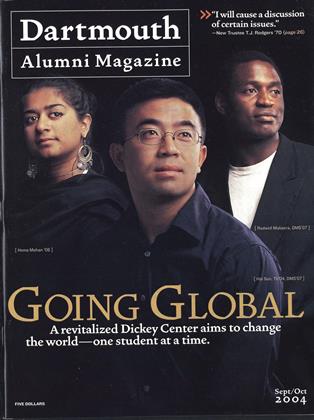QUOTE/UNQUOTE "I guess the big result from my research is that money buys happiness but less than perhaps we would have thought. Other things like marriage and sex bring a lot of happiness." ECONOMICS PROFESSOR DAVID G. BLANCHFLOWER ON THE "MONEY, SEX AND HAPPINESS" STUDY HE CO-AUTHORED WITH ANDREW J. OSWALD OF THE UNIVERSITY OF WARWICK, ENGLAND
EARLIER THIS YEAR, WHEN THE president of Texas A&M University decided to cease preferential treatment of legacy applicants, citing his concern for the "fairness and equity" of the admissions process, education experts predicted other schools would follow suit. In June Harvard President Larry Summers defended legacy admissions in The Wall StreetJournal as "integral to the kind of community that any private institution is." All this attention to the topic prompted DAM to call Dean of Admissions Karl Furstenberg for an explanation of College policies.
Places like Dartmouth have always given small preference to the sons and daughters of alumni," he says. "The pool of candidates is quite qualified and their knowledge and appreciation of the College is highly attractive."
Dartmouth does not employ a points system in ranking its applicants. Rather, legacy candidates are given what Furstenberg calls a small plus" in the final crunch of decisions; if a student hovers on the cusp of acceptance, legacy status maybe enough to tip the applicant toward admission. The acceptance rate of legacies, typically about 35 percent, is about double the overall acceptance rate but is lower than at some other top-tier schools. Harvard admits 40 percent of its legacy applicants while Williams takes 62 percent. Given the strength of the candidates, Furstenberg doesn't consider Dartmouth's rate inap- propriate, and asserts that the vast major- ity of legacies would have been admitted without the distinction.
Due to the size and quality of Dartmouths total applicant pool, Furstenberg is conscientious about the number of legacies admitted. Sons and daughters of alums constitute just 8 percent of the class of 2008. Perhaps surprising is that Dartmouth limits the definition of a legacy to the child of a B. A. degree holder; having two parents or multiple generations of relatives who are alums does not enhance legacy status.
Alumni can be encouraged that Dartmouths need-blind admissions policy covers legacies as well, and that normally no financial considerations, be they parental earning power or history of giving, are accounted in the process, according to Furstenberg. Only donors of a building or another similar largesse receive special consideration from the College. These "development cases" numberfewer than 10 a year, he says. He doesn't foresee the elimination of legacy admissions preferences at Dartmouth or any other schools of its ilk. He does, however, predict that the pool of legacy admittees will shrink in the future. 'As Dartmouth's selectivity increases because of a larger number of really qualified applicants, it has become tougher to get in as a legacy," he says.
Latest Legacy Twins Will (left) and JoePechter ’04 celebrated at graduationwith their dad, Richard ’75, also a legacy.
 View Full Issue
View Full Issue
More From This Issue
-
 Cover Story
Cover StoryThe Global Classroom
September | October 2004 By CHRISTOPHER S. WREN ’57 -
 Feature
FeatureSubjects of Style
September | October 2004 By JAY PARINI -
 Feature
FeaturePiano Man
September | October 2004 By BONNIE BARBER -
 Personal History
Personal HistoryDeath on the Chilko
September | October 2004 By John W. Collins ’52 -
 Interview
Interview“A Change Agent”
September | October 2004 By Lisa Furlong -
 Sports
SportsDouble Trouble
September | October 2004 By Chris Milliman, Adv’96
Lauren Zeranski '02
-
 Article
ArticleResponding to Sexual Assault
May/June 2004 By Lauren Zeranski '02 -
 Profile
ProfilePROFILE: Annelise Orleck
Sept/Oct 2005 By Lauren Zeranski '02 -
 Article
ArticleCoping Mechanisims
Nov/Dec 2005 By Lauren Zeranski '02 -
 Article
ArticlePROFILE: Barbara Will
May/June 2006 By Lauren Zeranski '02 -
 Article
ArticlePROFILE: Angela Rosenthal
Nov/Dec 2006 By Lauren Zeranski '02 -
 Profile
ProfilePROFILE
July/August 2007 By Lauren Zeranski '02







